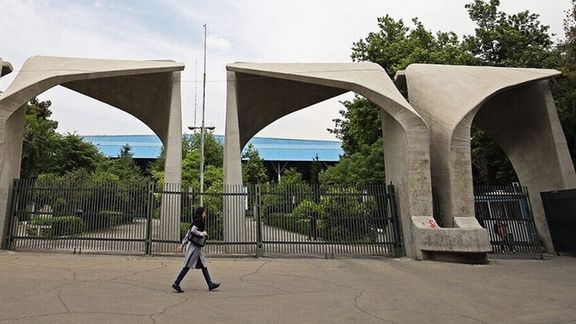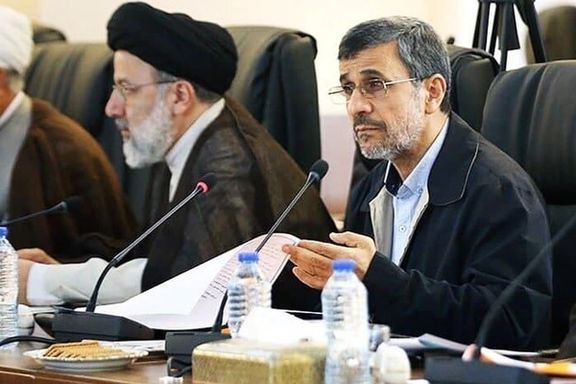Purge Of Professors: Iran Axed Hundreds Of Academics In 17 Years

Amid the regime’s intensified pressure on academia, a newspaper in Tehran has shed light on the purge of university professors in the past 17 years.

Amid the regime’s intensified pressure on academia, a newspaper in Tehran has shed light on the purge of university professors in the past 17 years.
In an article on Thursday, Etemad, one of Iran’s prominent reformist dailies, published a list of 157 tenured professors who were dismissed, forced into retirement, or banned from teaching for their criticism and dissenting views from 2006 to the end of August 2023. But the purge went beyond that, when non-tenured lecturers were replaced by "religious" and "revolutionary" professors.
The trend started after Mahmoud Ahmadinejad took office and continued in Hassan Rouhani’s administration and then under President Ebrahim Raisi, seeing successive governments in the Islamic Republic systematically expelling seasoned professors for their a "secular views," among other political reasons.
During a meeting with professors who were members of IRGC’s Basij forces in the first week of the purge, Ahmadinejad said that the main part of the professors’ duties is promoting “the culture and ideals of the Islamic revolution.” “The educational system and the approach to knowledge production need to change and Basij can play a role in promoting this in society," he said.
A year later and after firing dozens of professors, Ahmadinejad said "Our education system has been influenced by the secular system for 150 years... Changing this environment is challenging and complex, but the work has begun.” He also urged students to protest against the presence of “liberal and secular professors in universities.

During all these years, the regime also tried its best to employ professors in line with the ideals of the Islamic Republic, Etemad elaborated, providing numerous cases of such recruitments.
One such regime ideologue was Sadreddin Shariati, the controversial head of Allameh Tabatabai University who embarked on strict sex segregation at the university in early 2010s. After expelling dozens of professors and employing more than 100 new ones for the university, he said, “I mounted a coup d'état against Westernization, superstitions, and ignorance at Allameh Tabatabai University. I recruited religious professors so that they do not talk about secularism in their lectures.” The incumbent education minister, Reza-Morad Sahraei, was Shariati’s right-hand man at the time.
Another case was Farhad Rahbar, who was the head of Iran’s Azad University in 2017 and now serves as an aide to Raisi. He cancelled contracts of all part-time professors and one-year contracts of 168 full-time professors at the Faculty of Science and Research of this university, leading to chaos at the start of the academic year. He then put the names of 2,800 professors employed in various units of the Azad University on a dismissal list. He planned to replace them with new recruits but was himself dismissed before he could implement his plan.
According to a report from the Ministry of Science, Research, and Technology in 2013, during Ahmadinejad's presidency, approximately 17,000 new faculty members were added to universities payroll. Such a move is speculated to be repeated as President Raisi plans to add 15,000 "revolutionary" professors to the academic faculty of universities nationwide in the near future.
Raisi embarked on his ‘purification’ in the first month of his tenure, expelling Bijan Abdolkarimi, an associate professor in the Department of Philosophy at the Islamic Azad University. In January 2022, Mohammad Fazeli, a professor of sociology at Beheshti University, and Arash Abazari, a philosophy professor at Sharif University, were dismissed. This was just the beginning and even months before the popular uprising across Iran ignited by the death of Mahsa Amini in police custody in September.
Since then, a large number of academics voiced solidarity with protesters and once the protests were quelled, the Raisi administration intensified the crackdown, pushing professors into early retirement, not renewing teaching contracts, cancelling classes without prior notice, removing and suspending professors, and reducing monthly salaries. Apart from these prevalent methods, tens of professors have also been summoned or temporarily detained.
This policy, appears to be part of a wider initiative to cleanse universities of critics of the regime and efforts to suppress student protests, has also led to announced delays in the start of the academic term in some universities while several universities may hold lectures online to reduce chances of campus protests on the first anniversary of Women, Life, Freedom movement.